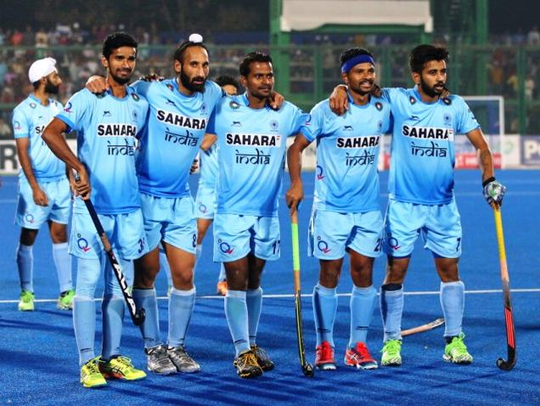New Delhi, Mar 21: Hockey India on Monday announced an 18-member Indian team led by Sardar Singh that will take part in the 25th edition of the Sultan Azlan Shah Cup to be held in Ipoh, Malaysia from April 6 to 16.
Besides India, New Zealand, 2012 Olympic bronze medallist Australia, Pakistan, Japan, Canada and hosts Malaysia will be taking part in the annual tournament.
While Sardar Singh will lead the team, S Sunil will be supporting him as the vice-captain. Besides two goalkeepers — Harjot Singh and Akash Anil Chikte, the squad will have five defenders: Rupinder Pal Singh, Jasjit Singh Kular, Kothajit Singh, Surender Singh, Harmanpreet Singh.
The midfield will be under the leadership of skillful Sardar and he will be assisted by Danish Mujtaba, Chinglensana Singh, Manpreet Singh, S K Uthappa, Harjeet Singh.
While Sunil, Talwinder Singh, Mandeep Singh, Ramandeep Singh, Nikkin Thimmaiah will form India’s forwardline.
With the 2016 Rio Olympics few months down the line, the Sultan Azlan Shah Cup will serve has as a barometer to measure the team’s preparation for the most important sporting event of the year.
“India has a good record in the Sultan Azlan Shah Cup and we would like to keep it that way. Being an Olympic year, this tournament assumes special importance as it will give us an idea where we stand. Playing against good teams like Australia, New Zealand and Pakistan and not to forget hosts Malaysia will give the team critical competition exposure. It will be a good opportunity trying out new things and new combinations in the tournament to see if they work,” said Sardar Singh.
In preparation for the tournament, the Indian men’s team is currently undergoing a training camp that started on March 7 at the SAI Centre in Bangalore.
“The boys have been working hard as a unified unit and are geared up for the tournament ahead. Azlan Shah will be good testing ground for us right before the Rio Olympics and will be very crucial for the team. We are focused on improving the game technically and implement the right strategies,” said chief coach Roelant Oltmans.
One of the concern areas of the Indian team has been the tendency to concede late goal.
“In the past we have conceded late goals that have taken away the games from us. We want to eliminate that particular weakness. We have been working on it for some time now, which we will be able to put to test in the tournament,” he added.
India have enjoyed a good run in the Sultan Azlan Shah Cup. They won the prestigious tournament five times in 1985, 91, 95, 2009 and 2010, while they earned bronze on six occasions and finished runners-up once in 2008.
The round-robin format will help the team get decent amount of competition exposure under its belt. It will also give them an opportunity to gauge the fitness level, since the conditions in Ipoh around this time of the year will be extremely hot and humid. The Indian team has shown considerable improvement in the fitness levels in the past couple of year.
Team
GOALKEEPER: Harjot Singh, Akash Anil Chikte
DEFENDERS: Rupinder Pal Singh, Jasjit Singh Kular, Kothajit Singh, Surender Singh, Harmanpreet Singh
MIDFIELDERS: Danish Mujtaba, Chinglensana Singh, Manpreet Singh, Sardar Singh, S K Uthappa, Harjeet Singh
FORWARDS: Talwinder Singh, Mandeep Singh, SV Sunil, Ramandeep Singh, Nikkin Thimmaiah.






Comments
Add new comment